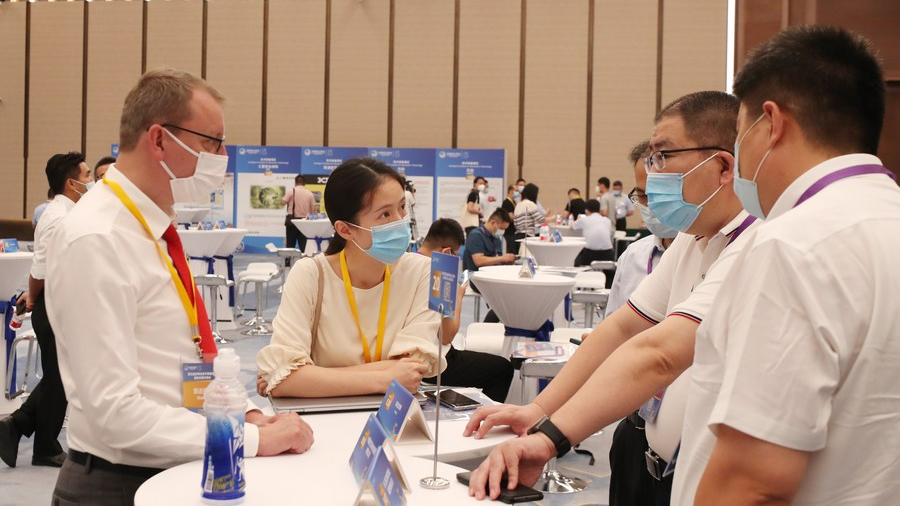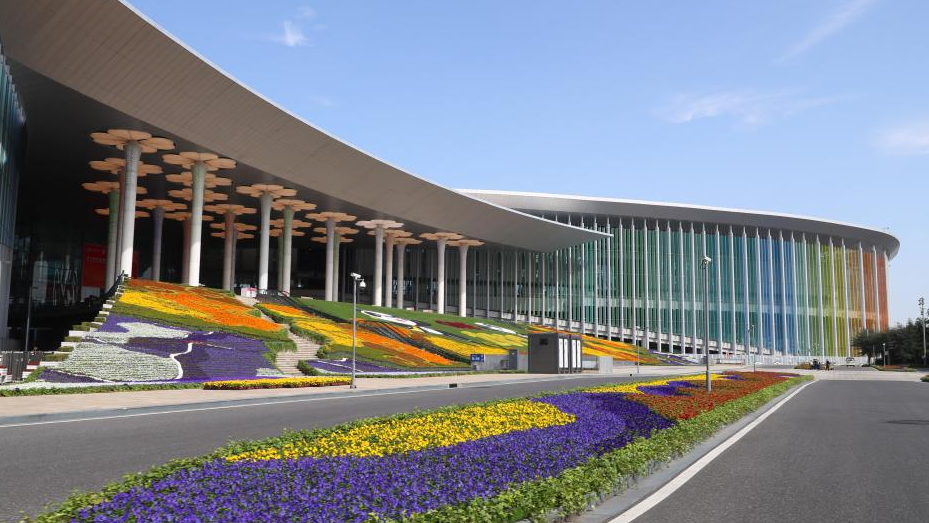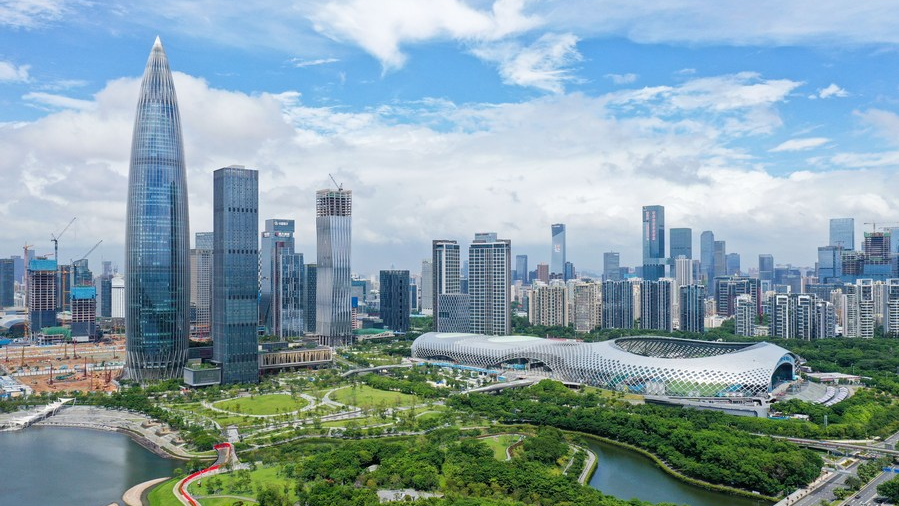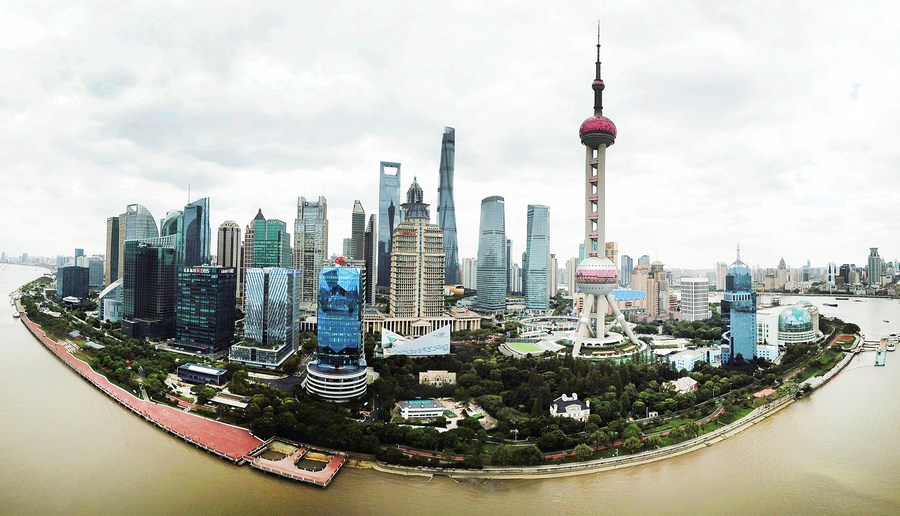The fifth China International Import Expo (CIIE), which will be held on November 5 to 10 in Shanghai, is set to welcome major companies from across the globe.
Over 280 of the world's top 500 enterprises and industry giants will participate in the event, among which nearly 90 percent are returning participants from last year, according to CIIE Bureau and General Administration of Customs.
Since 2018, the annual fair has showcased advanced technologies and products for foreign companies. It also serves as an open channel for international investment and procurement, part of China's drive to open its market to the world.
"Promoting high-standard opening up" is stressed in a report to the National Congress of the Communist Party of China (CPC), which said China should "steadily expand institutional opening up with regard to rules, regulations, management, and standards."

An exhibitor (2nd L, front) negotiates with potential buyers while attending a pre-expo supply-demand matchmaking meeting for the Intelligent Industry & Information Technology Exhibition Area of the Fifth CIIE, Shanghai, China, August 8, 2022. /Xinhua
An exhibitor (2nd L, front) negotiates with potential buyers while attending a pre-expo supply-demand matchmaking meeting for the Intelligent Industry & Information Technology Exhibition Area of the Fifth CIIE, Shanghai, China, August 8, 2022. /Xinhua
Exhibitors at the four previous events launched more than 1,500 new products, technologies, service items and clinched tentative deals with a business volume exceeding $270 billion, according to the Ministry of Commerce.
A number of high-tech products will make a debut, including Tesla's humanoid robot Optimus which applies powerful computer vision technology consistent with cars, as well as photosensitive resin 3D printers by Evonik Industries AG, which is suitable for making tough and impact-resistant materials.
This year, a "From Exhibitors to Investors" subsection is set up to celebrate the fifth anniversary of the expo. The artificial intelligence subsection and crop seed industry subsection are also established for the first time.
The world's top seed companies like Bayer, Corteva and Syngenta have signed up for the expo. Vice-President of Syngenta Group China Wang Hong said the company will strengthen connections with other companies in the industry during the event.

The south square of the National Exhibition and Convention Center, the main venue for the upcoming 5th CIIE in east China's Shanghai, October 24, 2022. /Xinhua
The south square of the National Exhibition and Convention Center, the main venue for the upcoming 5th CIIE in east China's Shanghai, October 24, 2022. /Xinhua
A booming consumer market
CIIE opens up opportunities for companies around the globe to tap into the Chinese market, which is growing rapidly as a result of rising incomes and strengthened purchasing power.
Data from the National Bureau of Statistics show that China's per capita GDP rose to nearly 81,000 yuan ($11,203) in 2021, which is higher than the world's per capita GDP. Per capita disposable income was 35,128 yuan ($4,855) in 2021, more than double the level in 2012.
Meanwhile, more people are moving into the middle-income class, with over 400 million middle-income earners in 2022 compared with 100 million a decade ago.
Over the next 10 years, the number of upper-middle-income and above households in China is expected to grow by almost 70 percent, according to a 2021 analysis by McKinsey Global Institute.
The growing purchasing power indicates the potential of the Chinese market, which companies, whether big-name multinationals or small start-ups, can access.
China's trade in goods and services expanded from $4.4 trillion in 2012 to $6.9 trillion in 2021, ranking first in the world.
Over the same period, China's actual use of foreign investment increased by nearly 63 percent. 47,643 enterprises had been established with foreign direct investment (excluding banking, securities and insurance), up by 23.5 percent on the previous year, official data shows.
"China has firmly implemented an opening-up policy, strengthened its ties with the world's major economies and attracted a large amount of foreign investment," wrote Ye Lin, law professor and director of the Legal Research Center of Business Environment at the Renmin University of China, on the CGTN website.
"Foreign investment has become an important link between the domestic and international markets."

Aerial photo of Houhai area in Nanshan District of Shenzhen, Guangdong, China, September 17, 2020. /Xinhua
Aerial photo of Houhai area in Nanshan District of Shenzhen, Guangdong, China, September 17, 2020. /Xinhua
Continuous optimization of business environment
Over the past few years, China has witnessed an improvement in its business environment by improving market regulation services.
In a World Bank report in 2020 on the ease of doing business, China ranked 31 out of 190 countries and regions, up from 78th in 2018. In terms of starting a business and protecting minority investors, it ranked 27th and 28th respectively.
The State Council sought to reform government functions in 2015 by streamlining administration, delegating power and strengthening regulation to improve the business environment.
In 2019, China issued the Regulation on Optimizing Business Environment, the first official document that clarified the correlation between the protection of intellectual property rights and the business environment.
Within the regulation, domestic investors and market entities are protected and foreign individuals and corporations can also get a valid patent or a trademark from the China IP administrative offices if they meet the statutory rules in intellectual property law.
"There was always room for further improvement of the business environment, market supervisors will continue to create an environment with fewer restrictions on market access, fair and orderly market competition and secure consumption," said Gan Lin, vice minister for market regulation at a press conference.
In 2021, six economically developed cities were selected to take the lead in developing international consumption centers, with the aim of pooling quality international market entities, goods and services as well as accelerating the cultivation of local brands.
The government also released a new guideline in 2022 to ease strains on small businesses and protecting the legitimate rights and interests of market entities.
Promoting high-standard opening up
Since the Foreign Investment Law was implemented in 2020, China has taken measures to encourage foreign investment and promote opening up at a higher level, including easing market access for trade in services and investment and increasing the proportion of trades in goods with zero tariffs.
So far, China has signed 19 free trade agreements with 26 countries and regions, and the trade volume between China and its free trade partners takes up around 35 percent of the country's total foreign trade, according to the Ministry of Commerce.

Aerial photo of the Lujiazui area, Shanghai, China, October 15, 2019. /Xinhua
Aerial photo of the Lujiazui area, Shanghai, China, October 15, 2019. /Xinhua
"In the current world, the trend of economic globalization is irreversible, and no country can build itself behind closed doors," said Zhao Chenxin, vice chairman of the National Development and Reform Commission at a press conference during the 20th National Congress of CPC.
"China will unwaveringly expand all-around high-level opening up and push for an economic globalization that is more open, inclusive, balanced and beneficial to all."
The country will reduce the negative list for foreign investment, protect the rights and interests of foreign investors and foster a world-class business environment, said the report.
China introduced its first negative list for foreign investment, which refers to a document that delineates industries that are prohibited or restricted to private investment by companies, back in 2017.
The latest version of the negative list, released in 2021, reduced the number of restrictive measures from 33 to 31 and for the free trade zones from 30 to 27. The shortened list is part of China’s efforts to facilitate a higher degree of opening up to attract foreign investment.
"Over the past decade, China has made full use of the domestic and overseas markets and resources therein to expand its foreign trade and economic cooperation … and create a new paradigm of opening-up to the outside world," wrote Chen Jian'an, vice chairman of the China Council for the Promotion of International Trade on CGTN.
The hosting of major exhibitions like CIIE demonstrates China's initiative to open its market to the world, he added.
(Cover image by Liu Shaozhen)